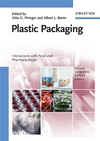French Consortium Aims to Develop Chemical Recycling of Plastic

A consortium of five companies - Citeo, Total, Recycling Technologies, Mars and Nestle - are partnering to develop industrial chemical recycling of plastics in France. The consortium will examine feasibility of recycling products currently considered non-recyclable, such as flexible food-grade packaging.
As part of Citeo’s call for projects to promote eco-design and recycling and recovery projects for plastic and paper in France, leading international energy company Total, plastic recycling technology provider Recycling Technologies, and global brands Nestlé and Mars joined forces to develop an innovative industrial chemical recycling industry in France.
The first-of-a-kind consortium of world-leading players from across the plastic packaging value chain will examine the technical and economic feasibility of recycling complex plastic waste, such as small, flexible and multilayered food-grade packaging. These products are currently considered non-recyclable and are therefore either incinerated or disposed of in landfills.
“This ambitious project meets Citeo’s goal of finding end-to-end solutions for all packaging. New recycling technologies, such as chemical recycling, will take performance to the next level and accelerate the circular economy for post-consumer plastic waste, especially when it is complex,” commented Jean Hornain, CEO of Citeo. “Our initiative will be a key driver to deliver short- and medium-term solutions.”
“By addressing the circular economy challenges of food-grade plastics, chemical recycling is a perfect addition to our existing mechanical recycling activities,” said Bernard Pinatel, president of Refining & Chemicals at Total. “The project announced today to develop an industrial sector involving major players in the packaging value chain is an important step in our ambition to produce 30% recycled polymers by 2030.”
“We are delighted to be the technology provider for this project,” said Elena Parisi, sales & marketing director at Recycling Technologies. “This cross-sector partnership is a great example of the industry working together to bring about the changes necessary to make plastic sustainable. We must carve out a clear pathway that others in the value chain will follow to boost plastic recycling capacity in France and elsewhere.”
“We are delighted to join this cross-value-chain consortium to help identify the right system to recycle flexible plastic packaging,” said Kate Wylie, Global Vice President, Sustainability at Mars. “In line with Mars’s Circular Packaging Plan including the goal for 100% plastic packaging to be reusable, recyclable or compostable packaging by 2025, we plan to reduce unnecessary packaging, redesign for circularity and invest to close the loop. Identifying and investing in the right waste management systems is a critical part of the solution to address the plastic waste problem. We support this new pyrolysis project in France to help identify circular systems for post-consumer plastic packaging and consequently increase the scale of recycling across Europe.”
“We are aiming for 100% of our packaging to be reusable or recyclable by 2025. Combining our expertise in a collective project to improve recycling is something we need to do to tackle the global plastic issue,” said Mathieu Tuau, head of packaging and sustainability at Nestlé France.
Citeo was created by businesses to reduce the environmental impact of their packaging materials and paper by transforming them into resources. With its subsidiary Adelphe, Citeo provides advice and solutions to its customers — manufacturers, businesses, distributors and consumer services — to help them affordably meet their responsibilities related to end-of-life packaging materials and paper.
Looking for a reprint of this article?
From high-res PDFs to custom plaques, order your copy today!








